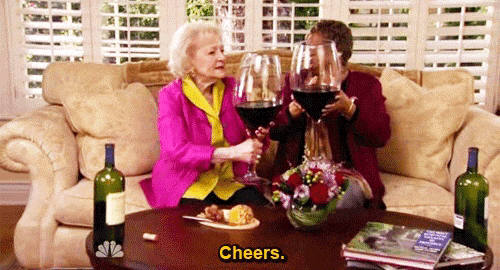Good wine, bad wine?

You’re out with your friends on a Tuesday night, sitting around a table in a busy restaurant talking about how your day went. You all decide you want to share a bottle of wine. The waiter brings the bottle and fills everyone’s glass. You take a sip, let it linger for a few seconds, and you finally swallow. You’re filled with a familiar feeling, warmth, and excitement at the same time. As the wine travels down towards your stomach, your body is welcoming the taste and the sensation that it brings with it. A grin slowly creeps on your face, and you think to yourself, man, this is some good wine.
. . .
Is there such a thing as good and bad wine? And if so, can we really tell the difference between them?
The question that we could start by asking is; how do we know the wine we’re drinking is bad or good?
Drinking wine can be a subjective experience. Don’t get me wrong; Enologists have spent many years studying wine, taking notes with every glass and observation, enhancing and refining their senses of taste and smell. But can we consider, just for a moment, that maybe we could be wrong about what we recognize as right when it comes to labeling wine under the “good” or “bad” category?
Research shows that even wine experts can be tricked.
Robert Hodgson, a retired statistics and oceanography professor, developed an interest in wine making in his early thirties. He got curious about how some wines would do so well in one competition and bad in another. It started in the early 2000s, when one of his wines won the San Francisco International Wine Competition Best of Show but didn’t win anything in another competition.
His research started by testing judges back in 2005. He wondered what would happen if he supplied them with 100 wines to judge, but without them knowing, some wines would be slipped to them three times. He stated that ”Only about 10% of judges are consistent, and those judges who were consistent one year were ordinary the next year.”
From the first four years of the experiment, results showed that a judge’s scores varied by plus or minus four points over the three blind tastings. Meaning that a wine believed to be a good 90 (on a scale from 50 to 100) would later be rated as an acceptable 86 or an excellent 94 minutes later.
“Chance has a great deal to do with the awards that wines win” — R. Hodgson

So maybe not all wine experts are right when it comes to taste testing. I mean, of course, some judges who are expert tasters with remarkable abilities, who have good sense when it comes to a small range of tasting. Still when confronted with a big number of testing, it is difficult to believe that they have the full capability to give out accurate results. It simply is beyond our human ability.
But he wasn’t the only one questioning the science of wine tasting. In 2008, Robin Goldstein conducted a study of 6,000 blind tastings and found out that there’s a link between the price of wine and the number of people enjoying it. But that was determined only by those who were trained to detect the factors that made wine expensive.
So now we take into account quality vs. quantity.
Do expensive wines taste better than cheaper ones?
Back in 2008, Antonio Rangel, an associate professor at Cal-Tech conducted a wine study, and have found that the changes in the prices of wine are not only influenced by how much the testers have enjoyed the wine but the activity of the brain region that is involved in our experience of pleasure. Rangel and his colleagues provided the testers with 5 samples of wine which, they were told, were identified with their prices; $5, $10, $35, $45 and $90. Throughout the study, their brains were scanned using functional magnetic resonance imaging, or fMRI.
The subjects consistently reported that they liked the taste of the $90 bottle better than the $5 one, and the $45 bottle better than the $35 one. Scans of their brains supported their subjective reports; a region of the brain called the medial orbitofrontal cortex, or mOFC, showed higher activity when the subjects drank the wines they said were more pleasurable.
But little did they know, there was a catch in the experiment. Even though they were told that they would be sampling 5 wines, they instead sampled 3. The first 2 bottles of wines were used twice but with different price tags. For instance, wine 2 was priced as the $90 wine (its actual price) and also as the $10 one. When the subject was asked which one they preferred, their answer was the $90 one. In a follow-up experiment, they sampled the same wine but without any price tags, and this time, they preferred the cheap wine over the expensive.
Maybe our expectation fools us somehow into believing that the more expensive it is, the better it tastes?
. . .
There are many factors that make a bottle of wine expensive. The cost of production, such as the cost of barrels and bottles, labor, marketing expenses, etc. Raw materials that are used can be quite costly. For example, if the wine produced was made from a low-yielding grape that was fermented in brand new oak barrels versus high-yielding grapes fermented in stainless steel tanks.
Some expensive wine bottles are expensive because they are labeled as a “luxury” product. But value is a subjective thing. It doesn’t mean that you enjoy a $10 bottle of wine less than a $50 one.
I think it’s safe to say that we all are affected somehow when it comes to choosing or labeling which wine is better than the other. Whether it’s the marketing, the region it is produced in, or its price, everyone has different criteria
So next time you’re in a liquor store trying to decide which wine to pick, think of which wine you think is good. Does good mean something that you may have spent a little extra on? Or the bottle that you randomly picked up on a Thursday night to take with you to a dinner party, that you have grown to love and enjoy every bit of ever since then? A specific type of grape or a distinct winery, perhaps? Whatever the reason is, at the end of the day, it depends on what you enjoy and like the most. You can read all the articles and watch all the videos telling you which one is better than the other, it all comes back to you.
You and the people you enjoy it with.
Cheers x


